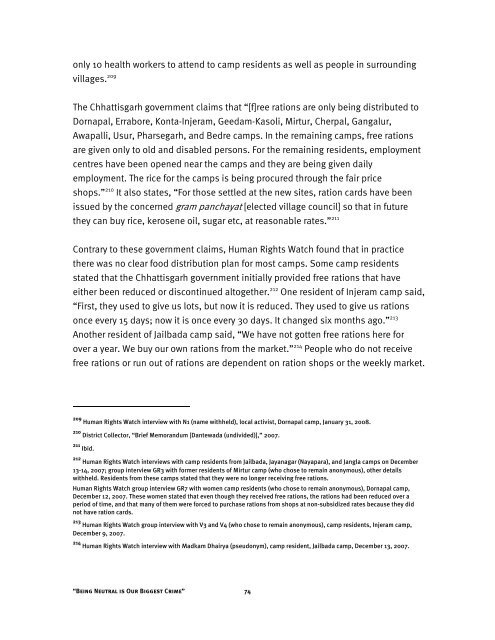âBeing Neutral is Our Biggest Crimeâ - Global Coalition to Protect ...
âBeing Neutral is Our Biggest Crimeâ - Global Coalition to Protect ...
âBeing Neutral is Our Biggest Crimeâ - Global Coalition to Protect ...
You also want an ePaper? Increase the reach of your titles
YUMPU automatically turns print PDFs into web optimized ePapers that Google loves.
only 10 health workers <strong>to</strong> attend <strong>to</strong> camp residents as well as people in surrounding<br />
villages. 209<br />
The Chhatt<strong>is</strong>garh government claims that “[f]ree rations are only being d<strong>is</strong>tributed <strong>to</strong><br />
Dornapal, Errabore, Konta-Injeram, Geedam-Kasoli, Mirtur, Cherpal, Gangalur,<br />
Awapalli, Usur, Pharsegarh, and Bedre camps. In the remaining camps, free rations<br />
are given only <strong>to</strong> old and d<strong>is</strong>abled persons. For the remaining residents, employment<br />
centres have been opened near the camps and they are being given daily<br />
employment. The rice for the camps <strong>is</strong> being procured through the fair price<br />
shops.” 210 It also states, “For those settled at the new sites, ration cards have been<br />
<strong>is</strong>sued by the concerned gram panchayat [elected village council] so that in future<br />
they can buy rice, kerosene oil, sugar etc, at reasonable rates.” 211<br />
Contrary <strong>to</strong> these government claims, Human Rights Watch found that in practice<br />
there was no clear food d<strong>is</strong>tribution plan for most camps. Some camp residents<br />
stated that the Chhatt<strong>is</strong>garh government initially provided free rations that have<br />
either been reduced or d<strong>is</strong>continued al<strong>to</strong>gether. 212 One resident of Injeram camp said,<br />
“First, they used <strong>to</strong> give us lots, but now it <strong>is</strong> reduced. They used <strong>to</strong> give us rations<br />
once every 15 days; now it <strong>is</strong> once every 30 days. It changed six months ago.” 213<br />
Another resident of Jailbada camp said, “We have not gotten free rations here for<br />
over a year. We buy our own rations from the market.” 214 People who do not receive<br />
free rations or run out of rations are dependent on ration shops or the weekly market.<br />
209 Human Rights Watch interview with N1 (name withheld), local activ<strong>is</strong>t, Dornapal camp, January 31, 2008.<br />
210 D<strong>is</strong>trict Collec<strong>to</strong>r, “Brief Memorandum [Dantewada (undivided)],” 2007.<br />
211 Ibid.<br />
212 Human Rights Watch interviews with camp residents from Jailbada, Jayanagar (Nayapara), and Jangla camps on December<br />
13-14, 2007; group interview GR3 with former residents of Mirtur camp (who chose <strong>to</strong> remain anonymous), other details<br />
withheld. Residents from these camps stated that they were no longer receiving free rations.<br />
Human Rights Watch group interview GR7 with women camp residents (who chose <strong>to</strong> remain anonymous), Dornapal camp,<br />
December 12, 2007. These women stated that even though they received free rations, the rations had been reduced over a<br />
period of time, and that many of them were forced <strong>to</strong> purchase rations from shops at non-subsidized rates because they did<br />
not have ration cards.<br />
213 Human Rights Watch group interview with V3 and V4 (who chose <strong>to</strong> remain anonymous), camp residents, Injeram camp,<br />
December 9, 2007.<br />
214 Human Rights Watch interview with Madkam Dhairya (pseudonym), camp resident, Jailbada camp, December 13, 2007.<br />
“Being <strong>Neutral</strong> <strong>is</strong> <strong>Our</strong> <strong>Biggest</strong> Crime” 74
















